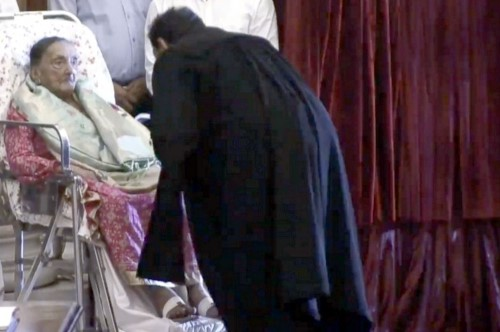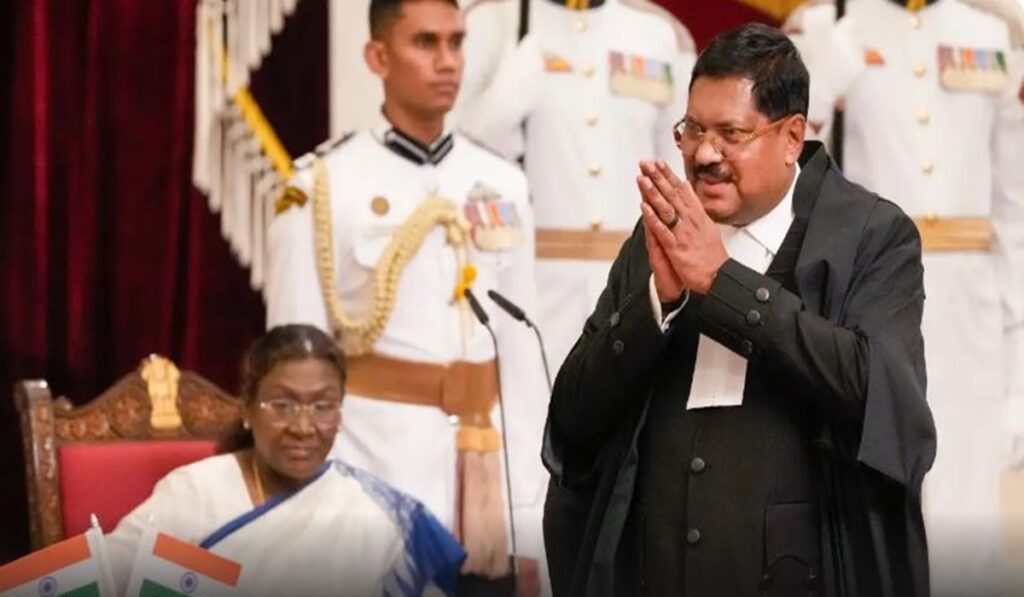By Senior Correspondent
Early Life and Family Background
NEW DELHI: Justice Bhushan Ramkrishna Gavai’s life is an inspiring story that shows that hardships… Bhushan Gavai was born on November 24, 1960, in Amravati, Maharashtra. His father, Ramkrishna Suryabhanu Gavai (known as ‘Dadasaheb’), was a prominent Ambedkarite leader, social activist, and the founder of the Republican Party of India (Gavai faction). He also served as the Governor of Bihar, Sikkim, and Kerala.
The Gavai family follows Buddhism and is inspired by the thoughts of Dr. B. R. Ambedkar. His mother, Kamala Gavai, raised the family in difficult circumstances, which provided Bhushan Gavai with the opportunity to receive education and move forward.
Education and Early Struggles
Bhushan Gavai received his early education in the municipal school of Amravati, which were located in slum areas. He once said, “It is only because of Dr. B. R. Ambedkar that a person like me, who studied in a municipal school in a slum area, was able to reach this position.” In 1985, he began practicing law and practiced independently in the Bombay High Court from 1987 to 1990. After that, he mainly specialized in constitutional and administrative law at the Nagpur bench. He also served as a permanent lawyer for the Nagpur Municipal Corporation, Amravati Municipal Corporation, and Amravati University.
Judicial Career
• Bombay High Court: He was appointed as an additional judge of the Bombay High Court on November 14, 2003, and became a permanent judge on November 12, 2005.
• Supreme Court: He was appointed as a judge of the Supreme Court on May 24, 2019, becoming the first Scheduled Caste judge to be appointed in 9 years.
• Chief Justice: He took oath as the 52nd Chief Justice of India on May 14, 2025, becoming the second Dalit to reach this position.
Thoughts and Contributions
Justice Gavai has always adhered to the values of the Constitution and the thoughts of Dr. Ambedkar. He stated, “Dr. Ambedkar said that the Constitution is not a book for lawyers, but a way of life.” Throughout his career, he has delivered many significant judgments that prioritize personal freedom and social justice. His judicial perspective reflects fairness and sensitivity.
Inspirational Message
Justice Gavai’s life is proof that despite difficulties, if a person has determination, hard work, and proper guidance, he can reach the highest peaks. His story serves as an inspiration for all those who wish to realize their dreams even in adverse circumstances.
Justice Bhushan Ramkrishna Gavai, the 52nd Chief Justice of India, has delivered several significant judgments in his judicial career that strengthen the values of the Indian Constitution, social justice, and the transparency of legal processes. His thoughts and decisions have focused on the independence of the judiciary and the protection of the rights of marginalized sections of society.
Major Decisions and Contributions
1. Declaring the Electoral Bonds Scheme unconstitutional Justice Gavai was part of the five-judge constitutional bench that declared the arrangement for secret donations to political parties, the Electoral Bonds Scheme, unconstitutional. This decision marked a significant step towards increasing transparency in political donations.
2. Stopping “bulldozer justice” In a historic ruling, he halted demolition actions carried out without prior notice. In this ruling, he emphasized the need for due process and fairness, thereby curbing administrative arbitrariness.
3. Upholding the validity of demonetization: In the case challenging the validity of the 2016 demonetization decision, Justice Gavai upheld it as constitutionally valid by a majority, believing that the decision was made under appropriate consultation and process.
4. Recognition of sub-categories within Scheduled Castes
He participated in a seven-judge bench that upheld the constitutional validity of the recognition of sub-categories within Scheduled Castes, paving the way for targeted assistance to the most backward classes.
5. Freedom of Expression of High Officials
In a bench of five judges, they ruled that no additional restrictions can be imposed on the freedom of expression of high officials, as the constitution already sets reasonable limits.
Justice Gavai’s Thoughts and Views
• Protection of Judicial Independence: He warned that if judges are not provided adequate protection, they may seek political protection, which could impact the impartiality of the judiciary.
• Commitment to social and political justice: Before taking office as Chief Justice, he reiterated his commitment to the principles of equality and dignity of Dr. B. R. Ambedkar, stating that he would strive to ensure justice for the marginalized sections of society.
• Adherence to judicial restraint: He supported judicial restraint by stating that judges should decide cases solely based on their discretion and avoid unnecessary interference in the actions of the executive or legislature.
Was there any objection to his appointment?
No, there was no major public objection or controversy. He was appointed by the President, and this appointment was made based on seniority. His appointment was made under the traditional seniority rule, so no one from the judiciary or legal community opposed it. The media or political parties also did not make any negative comments about him.
Has anyone advocated?
Yes, some aspects are definitely appreciated
1. Many have appreciated it in terms of social representation to see a judge from the Dalit community becoming the CJI.
2. Some legal experts and lawyers have praised his qualifications and judicial perspective.
3. Some social reform groups have called it a progressive step.



